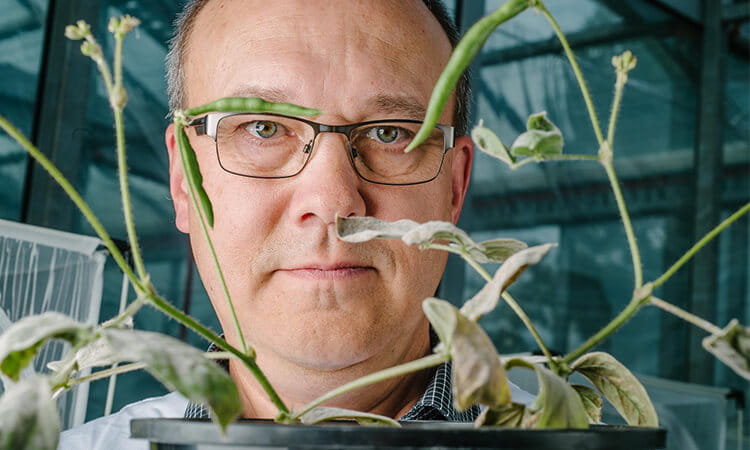Queensland, Australia
February 10, 2022

USQ Centre for Crop Health director Professor Levante Kiss. Photo: University of Southern Queensland
They might be considered canned goods at the back of the pantry for some, but for millions around the world, pulses – like chickpeas and mung beans – aren’t only a source of income, they’re also a critical source of nutrition.
World Pulses Day (Thursday February 10) is a designated United Nations global event to recognise the importance of pulses as a sustainable food.
At the University of Southern Queensland’s Centre for Crop Health, genomics and DNA based research is being carried out in several research projects that are helping to boost the local mungbean industry.
“Mungbean production is a $100m industry in Australia and is the country’s most widely grown summer pulse crop, produced mostly in Queensland and northern New South Wales,” Centre for Crop Health Director, Professor Levente Kiss said.
“Yield-limiting factors include pests and diseases, and this is where our University of Southern Queensland scientists are keenly involved to solve problems related to disease control in mungbean paddocks.”
Drawing on specific knowledge and expertise to deal with plant disease-causing microscopic organisms, Professor Kiss, and part-time PhD student Lisa Kelly – who is also a senior plant pathologist with the Queensland Department of Agriculture and Fisheries (DAF) – have recently discovered a new fungal species that contributes to powdery mildew epidemics on mungbean in Australia.
“We’ve made this discovery as part of a successful collaboration with other researchers from our University, DAF, and other scientist from overseas,” Professor Kiss said.
“Now we need further research to decipher the role of this new mungbean pathogen which can cause up to 40% yield loss if left unmanaged within conducive environmental conditions.
“Breeding disease-resistant and high yielding varieties of mungbean is the best way to ensure that the crop is healthy and highly profitable and through the Broad Acre Cropping Initiative (BACI), the University of Southern Queensland has been able to partner with DAF to deliver results that are indispensable for the success of their mungbean breeding program also.”
Other research led by Dr Niloofar Vaghefi at the Centre for Crop Health has recently delivered important new results that are being used to breed new mungbean varieties that are more tolerant to two bacterial diseases known as tan spot and halo blight.